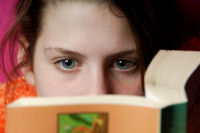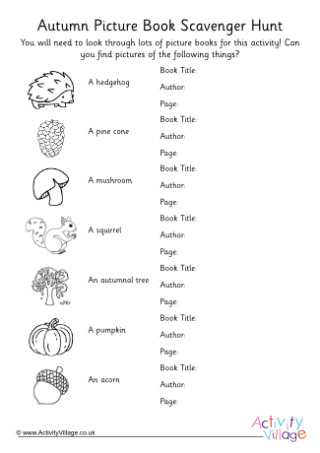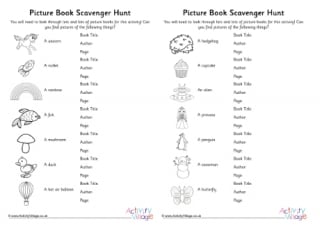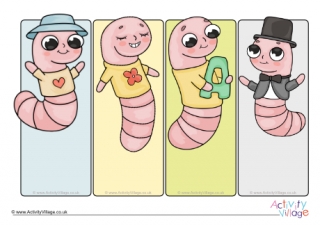Encouraging your child to read a wide variety of books is probably the best education you can give them - but sometimes it seems an uphill struggle! We have put together a collection of tips and tricks to encourage reading which may give you some ideas.

Library day:
If you live near to a good library, you could designate one day of the week "Library Day". In any event, try to visit regularly and spend time browsing through the books with your kids. Getting your kids their own library cards can be a huge incentive - and many libraries run special programs to encourage kids to take out books.
Read with your child:
Younger children like nothing better than to snuggle up with their parents to share reading time. You could try reading a page each - it helps to keep the pace up and make the story more interesting for your child, especially if they are struggling a little. You can also practice putting lots of expression into your reading: if your child learns to do this too, it will help their understanding (and of course prove useful when reading out loud at school!).
Read to your child:
Even adults like to be read to sometimes - so try not to grow out of the habit of reading to your kids! Obviously it helps when the kids are similar ages and have similar interests, but with a bit of perseverance you should be able to find something which you can read to all ages and enjoy! If not, split the reading up into age-groups, or perhaps ask an older sibling to read to a younger one occasionally.
Listen to audio books too:
These days it is easy to get hold of audio books for some of the best children's stories - either through your library or bookshops online and offline. You can also download audio books easily now for instant gratification, to be listened to either through an iPod or burned onto a CD, or find some good free versions of the classics Gutenberg. A good audio book can be enjoyed by all the family, whatever their ages, and can make a long car journey hugely enjoyable. Why not set up a club with friends so that you can swap and share to keep costs down?
Provide a good selection:
Just because a story was your favourite as a child, it is not necessarily going to be your child's favourite too. Times have moved on and there is a huge selection of children's literature out there and easily available now. Let your kids dip into all kinds of stories and non-fiction to find what interests them. If you want them to love reading, you have to give them choice in what they read.
Finishing books:
As adults we are not prepared to finish every book we begin - some are just plain dreary and we don't have enough interest in them to see it through to the end. Your child is the same. My kids were expected to finish every reading book they took out at school before they were given the next, and frankly sometimes even I felt like jumping off the top of a tall building rather than read to the end! I'm not saying you should let them off finishing every single book, but if they are really not enjoying their current book, consider whether the writing / story is really good enough to insist.
Fiction v. non-fiction:
Your child may not be a fiction lover, but don't despair. Reading any well-written book is an achievement - and you can get a lot of good information and practice off the back of a cereal packet in the mornings! There are some wonderful children's encyclopaedias available now, and various magazines for kids available by subscription which they will be really excited to receive each month in the post. The library will have shelves stocked with non-fiction for them to sample, and they may well end up being a fount of useful knowledge and developing some life-long interests, too.
Reading time:
Older kids can enjoy having a set "Reading Time" when everybody in the family - no exceptions - finds a comfortable place on a favourite chair or sofa and reads. Put some background music on if you like, refuse to answer the phone and drop all chores for at least half an hour.
Keep a record:
Sometimes keeping a record can make reading more fun - for all ages. You could buy each child a special notebook in which to record all the books they have read, and any thoughts they have on them. Encourage them to set up a rating system and possibly share it with their friends. Young kids enjoy getting a sticker on a chart when they have finished a book.
Another idea (which we used) is to create a "caterpillar" by cutting out colourful circles of paper. Decorate one to look like a cheerful caterpillar's face and then add circles for his body, one by one, each time your child finishes a book, writing the name of the book on the circle if you wish. You could have different coloured circles for each member of the family (if your kids can cope with the competitive aspect).
One mother I know kept a notebook record of every book her son ever read, including the date started and finished, and a mark for "enjoyment factor". After a while she started to stick in a small image for each book, taken off the internet, and her son (now a teenager) loves looking through his record and remembering his favourite stories. I wish we had done the same.
Rewards:
Sticker charts and certificates are a great way to remind children to do some reading every day, or record completed books. We've got some lovely reading certificates here at Activity Village. How about a trip to a favourite bookshop to reward a completed sticker chart, with a stop off for ice-cream after?
Provide bookmarks:
Reading can be made much more fun for kids by simple providing an appropriate bookmark. When they are young, try to find something on the same theme as the book (perhaps you could find some images on the internet to print off and laminate). As they get older bookmarks can be more creative. Get the kids to help you make some one rainy day with scraps of card and ribbon, use some of their artwork, cut up old greeting cards and postcards, make collages from magazines, or use photographs of family and friends.
Of course, we've also got a huge collection of printable bookmarks for you to explore! Our monster bookmarks are one of the most popular downloads on the site.
Older kids can write a message on the back of a bookmark and leave it in a favourite book for a younger sibling to find when they read the book later. Perhaps the older child could write a little about the book and why they enjoyed it, and put the date they finished it too. What a lovely surprise to find a few years later!
Hunt for second-hand books:
Specialised children's bookshops are becoming harder to find, although there are still some gems out there that should be supported as much as possible. Many offer story sessions, author signings and competitions, and of course they are a great way to get recommendations and look through the latest books. Chain book stores are getting much better at providing fun, dedicated children's areas and again have the latest offerings, glossy posters and promotional materials. But of course buying new is expensive and it certainly isn't your only option - and if you get the kids involved you could have a fun family outing too.
-
Charity stores and thrift stores often have books in excellent condition available for very inexpensive prices and are a great place for stocking up. You may even have a specialist charity book store near you. And it's always fun having a rummage...
-
Car boot sales and garage sales are a fabulous source and sadly sellers find that children's books almost have to be given away so prices can be ridiculously cheap. Don't be afraid to bargain, especially if you buy in bulk.
-
Amazon now has a huge amount of second hand books for sale, sometimes at giveaway prices. Children often write their own reviews of books, too, so you can get a good feel for what you are buying and whether it is going to appeal.
-
Swap with friends. You could even arrange a swap meet, where each child donates books and collects tickets to "buy" a number in return.
In these "throw away" days some children find it hard to own a book with a bit of wear and tear and signs of prior ownership. When we buy second-hand we always wipe down the covers with some kitchen cleaner which often freshens the books up considerably. If the covers have been really tatty we've covered up with scrapbook and wrapping paper or repaired with sticky-back plastic. I also found that by giving each child their own coins when we went hunting, they were often excited to bring home books which they would almost certainly have turned their noses up at if I had produced them! 50p given to each child would often result in 3 or 4 books coming home and earning a treasured position on the kids' bookshelf.



